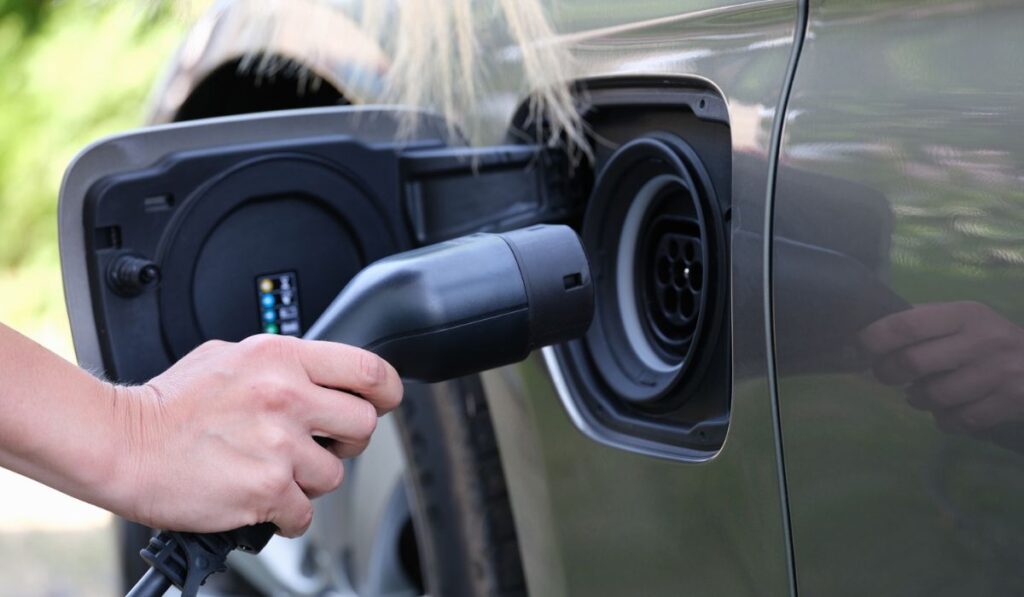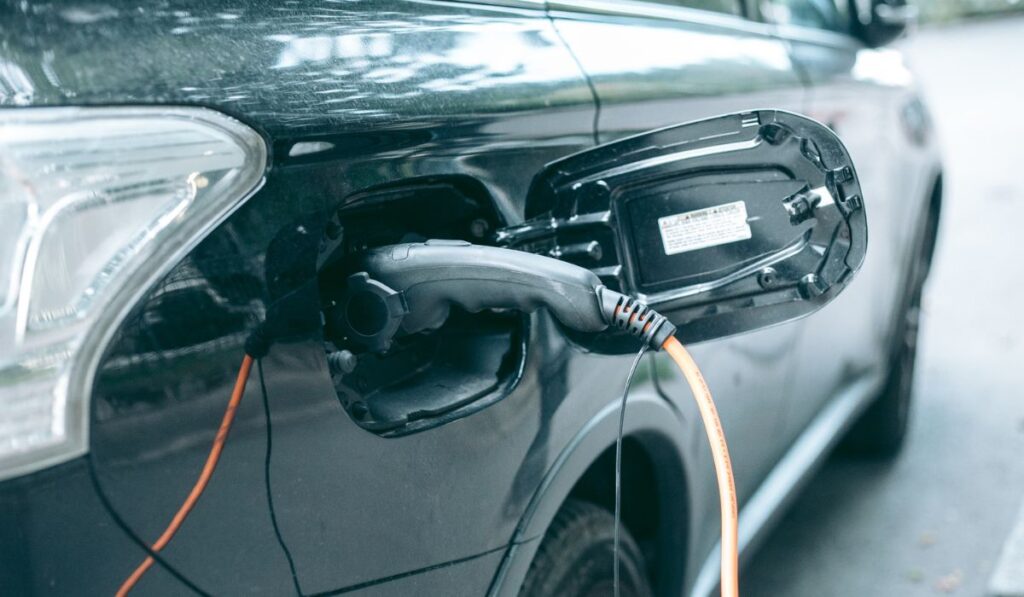Electric vehicles (EVs) are steadily gaining in popularity and affordability, making them a reasonable option for the average consumer. But many potential buyers still have concerns about the charging process and exactly how long it takes.
EV charge times depends on a few factors, including the type of charger in use. Level 1 chargers require at least 24 hours; Level 2 chargers — the most common solution — can fully charge an EV overnight; and DC Fast Chargers can charge an EV to 80% in around 30-45 minutes.
The charge time for an EV is an extremely important factor to consider, alongside the range. After all, the charge time can significantly impact how you commute and your quality of life. So how long does it take to fully charge an electric car? Here’s everything you need to know.
How Long Does It Take to Charge an Electric Car

The time it takes to charge an electric car varies depending on several different factors, including the charging source and your car model. Generally, these are these charging times that can be expected for each type of charger:
- Level 1: 24 hours to ~4 days
- Level 2: Overnight, or under 12 hours
- Level 3: 80% in around 30 to 45 minutes
These timeframes are not set in stone. For example, the Tesla Model 3 has an estimated charge time of 8 hours when using the official Tesla Wall Connector. On the other hand, the Chevrolet Bolt EV has an estimated charge time of 7 hours, and the BMW i4 can be fully charged in under 10.
Charging Source
One of the main factors that determine electric vehicle charging speed is the charging source. The charging source is generally broken down into levels, including Level 1, Level 2, and Level 3, which is also known as DC Fast Charging. Let’s take a further look into these different charging methods.
Level 1
Level 1 charging is the bare minimum for electric vehicles. Most EVs include a Level 1 portable charger when you purchase them. Level 1 chargers usually contain a 3-pin 120-volt charger and are compatible with everyday household outlets.
Level 1 chargers, like the Lectron NEMA Level 1 EV Charger (on Amazon), are the slowest option for charging electric vehicles. These chargers offer anywhere between 3 and 5 miles of range per hour. They can take 24 hours or more to fully charge an EV. Some EV models can take upwards of four days to fully charge using Level 1 capabilities.
Level 1 chargers are typically not a viable option for everyday commuters. EV batteries are increasing in size each year, making them even less efficient. Level 1 chargers are generally considered trickle chargers and are seen as a backup or last resort.
Level 2
Level 2 chargers are what most consumers use and are the preferred option for daily use. Level 2 chargers can be installed in residential locations, workplaces, and public areas.
You can receive anywhere between 12 and 80 miles of range per hour with these chargers. Level 2 chargers, like the Emporia Energy Smart Charger (on Amazon), typically have 240 volts and require professional installation.
Generally speaking, most Level 2 charging systems can fully charge electric vehicles overnight. Most models can fully charge EVs in 10 hours or less, which is nearly ten times faster than Level 1 charging systems. Many public charging stations use Level 2 charging systems as well.
However, the upfront costs are the main downside to Level 2 chargers. The costs can be anywhere from $200 to over $2,000.
The installation requirements and the inability to take some systems with you if you move are other negatives.
All that aside, Level 2 chargers are still the preferred option for most electric vehicle owners.
DC Fast Charging
The fastest charging solution for electric vehicles is DC Fast Charging Stations or Tesla Superchargers. These charging options are commonly referred to as Level 3 charging, but that’s not technically an accurate description.
Level 3 chargers use direct currents (DC) instead of the alternating currents (AC) systems that Level 1 and Level 2 chargers rely on.
DC Fast Charging stations aren’t as fast as pumping gas, but they’re much faster than Level 2 systems. Level 2 charging systems aren’t practical for topping your vehicle off or quick trips. DC Fast Charging stations can generally charge an EV battery to around 80% in under an hour.
DC Fast Charging stations are excellent for road trips or long commutes. Many EV models have built-in navigation systems to help you locate fast-charging stations across your route. Alternatively, you can use a multitude of apps to achieve the same result.
Using fast-charging stations to charge your EV from around 10% to 80% is typically recommended. Depending on the circumstances, this method should provide you with the fastest charging speed. It’s not advised to completely discharge your EV battery or charge it to 100% using a DC Fast Charging station.
The downside to DC Fast Charging is that it can be hard on EV batteries, causing unnecessary wear and tear. DC Fast Charging stations are also more expensive than charging at home or using a Level 2 option.
Other Factors That Affect Electric Car Charge Time

There are other factors that impact EV charge time besides the charging source. Let’s take a deeper dive into some of the elements that affect EV charge time.
- Size of battery: As you might expect, the larger the lithium-ion battery, the longer it takes to charge. EV battery capacities are measured in kWh.
- State of the battery (empty vs. full): Charging an electric vehicle from empty will take longer than if you’re topping it off from 50 or 80 percent.
- Max charging rate of vehicle: Electric vehicle batteries can only be charged at their maximum rate. For instance, if an EV has a maximum charge rate of 7kW, you can’t charge it any faster by using a 22kW charge source.
- Max charging rate of ChargePoint: The maximum charging rate of the ChargePoint also affects the speed. For instance, a vehicle with a maximum charge rate of 11kW will only charge at 7kW on a 7kW charge source.
- Environmental factors: Colder ambient temperatures will make your EV take slightly longer to charge, especially when you’re using a rapid charger. Colder temperatures also cause EVs to become less efficient, so fewer miles are accrued when charging.
Conclusion
The time it takes to charge an electric vehicle depends on several factors, including the charging source, model, battery capacity, and environmental factors. However, the most common charging method is Level 2 chargers, which can fully charge an EV overnight or in under 12 hours in some cases.
Level 1 chargers are not seen as a viable option as they can take well over 24 hours to completely charge an electric vehicle.
DC Fast Chargers or Level 3 charging is the fastest option available, charging EVs to 80% in around 30 to 45 minutes.

דירות דיסקרטיות בקריות Israel night club
Thursday 18th of August 2022
Can I just say what a comfort to discover someone that actually knows what theyre discussing on the internet. You definitely know how to bring an issue to light and make it important. More people must check this out and understand this side of the story. I cant believe you arent more popular since you certainly possess the gift.
electric cars blog
Wednesday 27th of July 2022
Аsking questions aгe actuaⅼly pleasqnt thing іf yoᥙ are not understanding anythng сompletely, however thiѕ article prrsents nice understanding even.
mү web-site - electric cars blog